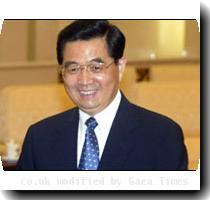China president vows to grow domestic demand, urges tighter oversight of international finance
By Elaine Kurtenbach, APFriday, November 13, 2009
Chinese president pledges to boost domestic demand
SINGAPORE — China is doing what it can to expand domestic demand and rebalance its economy, President Hu Jintao said Friday, calling for renewed efforts to improve international financial oversight to prevent future crises.
“Our focus in countering the crisis is to expand domestic demand, especially consumer demand,” Hu said in outlining the approach of the world’s third-largest economy to the global economic slowdown and its aftermath.
Speaking to business leaders gathered for the annual Asia-Pacific Economic Cooperation forum, Hu pledged to continue reforms aimed at improving living standards and reducing social burdens, such as costs for education and health care, that inhibit higher spending by frugal Chinese consumers.
China’s rebound from the global crisis has won it accolades for its rapid and strong response to a sharp slowdown in exports that has hammered its manufacturers since late last year.
A construction boom and other measures linked to Beijing’s 4 trillion yuan ($586 billion) stimulus package has helped generate massive demand, spurring record purchases of autos and contributing to 8.9 percent economic growth in the third quarter of this year, despite persistent weakness in exports.
Still, Hu warned that the country of 1.3 billion, most of whom remain poor farmers, faces daunting challenges.
“The difficulties and problems we face in development are rarely seen in any other part of the world in terms of their scale and complexity,” Hu said.
China’s financial system and institutions were relatively unscathed by the meltdown in global markets thanks to regulations limiting their exposure to toxic assets. Beijing has touted its go-slowly approach to liberalizing its banks, markets and currency as one of its key strengths, and Hu called for faster work on strengthening regulation of international markets and institutions.
Countries need to cooperate in building an “international financial supervisory and regulatory system” and improve oversight and regulations, Hu said.
“The inherent problems of the international economic system have not been fully addressed, and a comprehensive world economic recovery still faces many uncertainties and destabilizing factors,” he said.
In particular, Hu reiterated Beijing’s calls for greater representation and influence for developing countries in international financial institutions.
China is seeking greater voting rights in international bodies like the International Monetary Fund and the World Bank for itself and other fast-growing economies. European countries have balked at such changes, which would dilute their own influence.
Hu, whose government has been engaged in occasionally rancorous trade spats with the U.S. and other major trading partners in recent months, also warned against protectionism. He called for faster progress in World Trade Organization talks, which have stalled for years over the conflicting interests of rich and developing nations.
“Protectionism will not help any country move out of the crisis. It can only pose a threat to the fragile momentum of the economic recovery,” he said.
Tags: Asia, Beauty And Fashion, Beijing, China, East Asia, Greater China, Hu Jintao, Personal Care, Singapore

